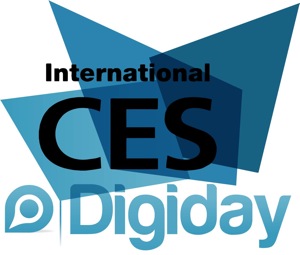Secure your place at the Digiday Publishing Summit in Vail, March 23-25

 Digiday is at the Consumer Electronics Show. Lead agency reporter Jack Marshall will examine the show through the eyes of agencies and their clients, exploring the opportunities and challenges that new technologies and devices offer them. Follow Jack on Twitter @jackmarshall.
Digiday is at the Consumer Electronics Show. Lead agency reporter Jack Marshall will examine the show through the eyes of agencies and their clients, exploring the opportunities and challenges that new technologies and devices offer them. Follow Jack on Twitter @jackmarshall.
CES is drawing to a close, and after the initial hype around the major brand exhibitors at the show had died down, many agency and brand attendees had the chance to scour the smaller halls in search of innovation. Here are four that brands should pay attention to.
Users, not devices
A theme of this years CES has been a focus on users, rather than the devices themselves. Exhibitors took care, it seemed, to pitch the consumer benefits of their products rather than the technologies themselves. There was more of an emphasis on the practical implications versus the pie-in-the-sky factor that normally abounds.
Making Data Personal
Many of the devices on display here this year are designed to help consumers collect and analyze data about themselves, their behaviors, and their daily lives. Exhibitors demonstrated washing machines that feed you analytics about your laundry habits, for example, as well as home-automation products that promise to help you optimize your use of electricity. Data, it seems, will soon play a much larger part in consumers’ daily lives, whether they’re aware of it or not.
Health takes center-stage
A huge number of exhibitors in the smaller halls are here pitching health-related products. Some, such as Fitbit are following in the footsteps of products like Nike Plus, and using data to help inform people’s lifestyle choices, while others simply aim to make things like heartbeat monitors more user-friendly and accessible. Agency executives agreed that the opportunity for brands to jump on the fitness and well-being bandwagon is a huge one.
Education
Another prominent trend was the use of technology for educational purposes, and the continued attempt to “gamify” the learning process, particularly for children. Everything from miniature robots and speaking toys to tablets specialized for autism were on display. Again, agency executives were excited by the ability to use technology to improve people’s lives, and the opportunities that might present brands to inject themselves into the equation.
More in Marketing

Yahoo pauses IAB membership amid a series of quiet cost-saving measures
Yahoo pulls IAB board memberships, following job cuts as PE-owner reportedly reconsiders ad tech investments.

Target looks to e-commerce, advertising investments to help grow the business
Technology is one of the most important areas in which Target will invest with the hopes of returning to profit growth.

‘The conversation has shifted’: The CFO moved upstream. Now agencies have to as well
One interesting side effect of marketing coming under greater scrutiny in the boardroom: CFOs are working more closely with agencies than ever before.





